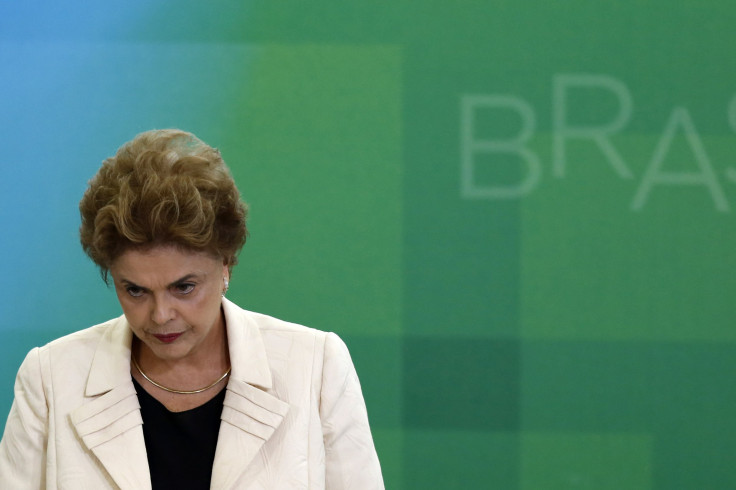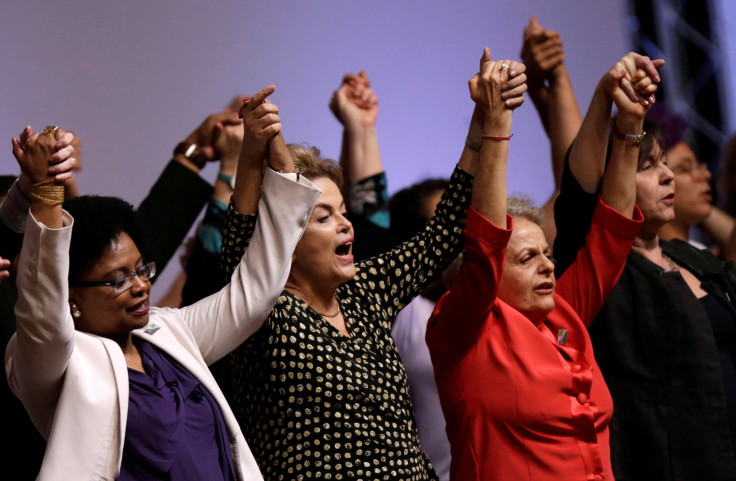Dilma Rousseff Impeachment: Brazil Senate Vote To Go Ahead

Brazil’s embattled President Dilma Rousseff faces the strongest challenge yet to her leadership when the Senate votes Wednesday whether she should be subjected to an impeachment trial. The lower house of the Brazilian parliament, the Chamber of Deputies, already voted overwhelmingly in favor of impeachment last month — a vote that was annulled Monday by Waldir Maranhão, the new speaker of the lower house, who revoked his decision Tuesday.
A simple majority vote in the 81-member Senate is enough to start impeachment trial proceedings against Rousseff, Brazil’s first female president. If approved, the proceedings will start with her stepping down for up to six months while an investigation into her alleged wrongdoings takes place. Vice President Michel Temer will become acting leader of the country until November when Rousseff will get the chance to defend herself. After that, another vote will be held in the Senate and she will be impeached if two-thirds vote in favor.
The allegations against Rousseff and the attempts to impeach her began in December when then-speaker of the Chamber of Deputies, Eduardo Cunha, blamed her for fiscal mismanagement of the budget to hide deficits and use money to bolster the government’s popularity ahead of her re-election in 2014.
In her defense, Rousseff has said such accounting practices had been used by many previous presidents. She has also called the attempt to impeach her a “coup.”
The legal basis for her impeachment aside, opinion of both lawmakers and the public has been largely swayed in recent months by the massive corruption scandals in South America’s biggest economy. A multimillion-dollar kickback scheme at the state-run oil giant Petrobras, from which Rousseff didn’t profit personally, has nonetheless been linked to her as she was chairwoman of the company through many years of the alleged corruption.
“The people involved abused and took advantage of the opportunity to steal money in an absurd way. This had to come to an end. And the actual government is directly linked to this,” Tiago Gomes da Silva, a 33-year-old standing in line at an unemployment office in Rio de Janeiro, told the Associated Press.
The severe downturn in the economy — Brazil is in recession for the last two years after being among the fastest growing economies for a few years before that — has only added to the resentment against her.

In a last-ditch effort to prevent Wednesday’s vote in the Senate, José Eduardo Cardozo, the solicitor general in Rousseff’s government, said Tuesday he asked the Supreme Court to rule on the validity of the impeachment vote in the lower house.
While the court hears the petition, the Wednesday vote is expected to proceed as scheduled. Senators will start discussions in the morning and the vote is expected to take place late evening.
Rousseff has remained defiant, telling supporters during a speech Tuesday: “I will not resign, that never crossed my mind.”
Her supporters have been protesting the impeachment proceedings, blocking roads and clashing with the police in various parts of the country. There are also calls for national strikes by labor unions.
© Copyright IBTimes 2024. All rights reserved.





















